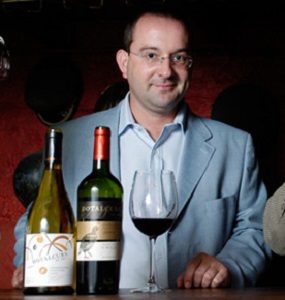Name: Philippe Debrus

Currently: Winemaker for Botalcura
Website: www.botalcura.cl
Questions:
Please, tell us about how you got into wine, the wine industry and how your career developed?
I was born in wine family in the Languedoc region. Instead of bringing the grape to the cooperative winery, my grandfather build a winery in the tractor hangar, with direct access from the house kitchen. Since young kid I was in charge to fill the daily bottle direct from the tank, which was a challenge of courage because the place was poorly lighted, and scary. It was a 500.000 L winery with squared, 2 levels piled up cement tank. Of course I could leak the last drop when filling the bottle with the funnel.
I began to work officially in the winery and vineyards at the age of 16 years, first during vacations or weekends. I could make some pocket money this way.
Then we conversed with some cousins about doing something together. At that stage I ran enological studies. I was 24. During the studies I was sent to Mr. Brumont (Chateau Montus – Madiran) to make a thesis about vinifications. The Thesis won the 2nd national award, and Mr. Brumont sent me to Mr. Guigal (Guigal – Cotes Rotie) where I stayed a couple of years. Then Mr. Guigal sent me to Kunde Winery – Sonoma, where I stayed another couple of years and where I met Mr. Paul Hobbs. Then Mr. Hobbs sent me to Valdivieso winery – Chile, with the mission to set a wine laboratory and help to develop working methods for high quality wines. Once again I stayed at Valdivieso for a couple of years, until Kendall Jackson called me to help setting a project for them in Chili (viña Calina). 2 years later, Valdivieso called me back to take in charge their winery. It was a master project, we worked together during a period of 10 years, were twice champion of Chile at vinexpo (97-99). Then I started a wine consulting company, got involved in partnership with Botalcura, and have helped to develop this project mainly, and other wine consulting in Chile and Spain.
What is your philosophy to making wine and viticulture?
Global philosophy consists in looking for any natural quality potential in the vineyards, then in the wines, enhance those factors through enological procedures, and –most important- never do anything useless. In resume, we try to do as less as possible. The main focus in the vineyard consists in reaching the natural balance and homogeneity of the plants. This allows us to reduce human intervention. Winemaking obey to the same rule, having a wine self balanced, then less intervention is necessary. We do not force natural elements, instead we try to adapt ourselves to the potential of nature, and try to orientate within different styles, whenever it is possible.
Which cultivar is your favourite to work with and why?
Since, I have been in Chile, I have enjoyed producing new varieties: first pinot noir, first cabernet franc, first nebbiolo. I would say that I enjoy working on unusual wines, it brings more fun than routine.
How do you see the future of wine production and what are the challenges and the opportunities?
I firmly believe into low alcoholic percentage in wines, whether sparkling or still wines. It satisfies various gaps in the market: it raises the level of competition against beer (let's make grape beer). It allows the mature drinker to drink more wine without getting drunk, helps working lunch without nap, or driving after dinner. On the other hand it helps to introduce a non alcohol or a casual drinker to try the wine. Challenge consists to maintain the same quality in a light wine than in a normal one.
Informality around wine is also something that should develop: why keeping using a glass bottle? Can, ketchup bag could make it. Why not drinking wine directly from the bottle? It is certainly possible to admit that no glass is needed, no corkscrew, challenge is to change the perception as noble product that needs respect.
Nonetheless, the high class wine market will certainly keep traditions and glamour stuck to the consumption of wine, and it is also perfect and needed like this.
Where do you see the global wine market in 2025?
Wine production will always have to follow the wine consumption. World conjunctures, crisis or emerging countries will bring some waves into the system, but normally wine consumption should keep raising, as long as population grows, no necessary in total heads, but in adults in age of consumption. Since baby boom impact will not last forever, it is certainly a good idea to be flexible and adapt to different segments of the population which could change seriously the way of drinking wine. Other aspect to consider is entering new markets as Asiatic, Indian, African, and definitely the challenge consists in adapting some way of life, cultural habits or even religious, but it will be a long work and more than a generation to see some results. Therefore let's stop losing time.
Philippe Debrus
@ by Dominik Kozlik – Zeitgeist Sommeliers - www.sommelier-jobs.com

Dominik Kozlik e.U.
78/12 Gruberstr.
4020 Linz, Austria